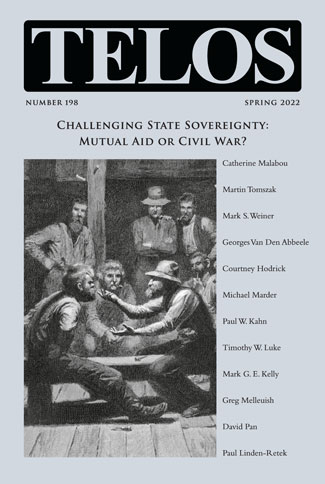Telos 198 (Spring 2022): Challenging State Sovereignty: Mutual Aid or Civil War? is now available for purchase in our store. Individual subscriptions to Telos are also available in both print and online formats.
 State sovereignty has a complicated relationship to individual rights. They are clearly in opposition, and both left-wing anarchist and right-wing libertarian critiques of the state have attempted to defend individual freedoms against the power of the state. Yet more traditional liberals and conservatives often see the state as the guarantor of individual rights, the left looking to the state as a provider of welfare services to the disadvantaged, and neoconservatives defending state power as the guarantor of individual rights against foreign aggressors as well as domestic enemies. These four different approaches map out a political landscape that is divided not just into left–right but also into pro- and anti-state tendencies.
State sovereignty has a complicated relationship to individual rights. They are clearly in opposition, and both left-wing anarchist and right-wing libertarian critiques of the state have attempted to defend individual freedoms against the power of the state. Yet more traditional liberals and conservatives often see the state as the guarantor of individual rights, the left looking to the state as a provider of welfare services to the disadvantaged, and neoconservatives defending state power as the guarantor of individual rights against foreign aggressors as well as domestic enemies. These four different approaches map out a political landscape that is divided not just into left–right but also into pro- and anti-state tendencies.
In spite of this fragmentation, though, there are two main concerns that are shared. In the first place, there seems to be a general recognition among these different perspectives that the inhabitants of a state are not completely homogeneous and that the internal heterogeneity of a state should be at least in part the basis for domestic order. If libertarians prefer market-based structures and traditional conservatives look to family and religion, liberals seem to have gravitated toward identity-based groupings, and anarchists might prefer mutual aid organizations as independent places of sovereignty within which individuals can define themselves. The disagreements concern the type of heterogeneity that is being called for as well as the precise mechanisms for supporting diverse organizations within the state.


